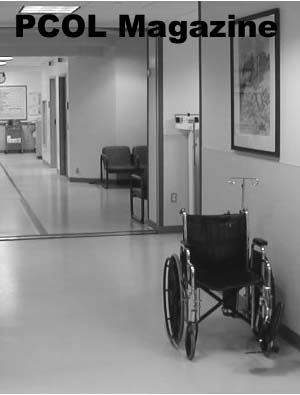October 28, 2003 - Dayton Daily News: Volunteer believes lack of support cost her right eye
Peace Corps Online:
Peace Corps News:
Special Reports:
October 26, 2003: Dayton Daily News reports on Peace Corps Safety and Security:
Archive of Primary Source Stories:
October 28, 2003 - Dayton Daily News: Volunteer believes lack of support cost her right eye
Volunteer believes lack of support cost her right eye

Former Peace Corps volunteer Beth Heyward of Jacksonville, Fla., lost her right eye after being misdiagnosed while serving in Africa. Photo. Chris Stewart/ Dayton Daily News
Read and comment on this story from the Dayton Daily News on Lesotho Volunteer Beth Heyward who questioned her care in a South African hospital for the treatment of shingles. The Peace Corps' medical officer initially diagnosed Heyward with a simple eye infection and gave her antibiotics. The next day, after Heyward continued to complain of pain, the agency sent her to a hospital in South Africa."I didnít have an advocate, and thatís what I feel that any Peace Corps volunteer that has any kind of issue (should have) whether itís medical, or whether theyíve been attacked," she said.
Heyward told Peace Corps officials she wanted to return to the United States. The Peace Corpsí medical staff in Lesotho said before evacuating her they would consult doctors in Washington. The agency says Heyward agreed to wait. U.S. doctors determined she was getting the proper treatment, according to her medical records.
The agency says in a written statement that Heyward received "excellent medical care." "There is no indication. . .that anything more could have been done from a medical standpoint with regard to her extremely rare and serious condition," the statement says.
Back in the US, Doctors tried unsuccessfully to save her eye, and eventually determined that shingles had caused her retina to detach. In January 1996, Heyward had her right eye removed. She blames the agency for failing to assure that she got adequate medical care, which might have saved her eye. Read the story at:
Volunteer believes lack of support cost her right eye*
* This link was active on the date it was posted. PCOL is not responsible for broken links which may have changed.
Volunteer believes lack of support cost her right eye
Beth Heyward says her pleas to go home for medical treatment were ignored
By Mei-Ling Hopgood
Dayton Daily News
Beth Heyward remembers distinctly the evening of March 22, 1995, when a ray of light pierced her eye.
In the week that followed, she endured searing pain ó from the disease and from the needles that shot medicine into her eye.
All the while, she questioned her care in a South African hospital. Ultimately, Heyward lost her right eye, having contracted shingles during her service as a Peace Corps volunteer in Lesotho.
She blames the agency for failing to assure that she got adequate medical care, which might have saved her eye.
"I didnít have an advocate, and thatís what I feel that any Peace Corps volunteer that has any kind of issue (should have) whether itís medical, or whether theyíve been attacked," she said.
The agency says in a written statement that Heyward received "excellent medical care."
"There is no indication. . .that anything more could have been done from a medical standpoint with regard to her extremely rare and serious condition," the statement says.
Access to quality health care is limited in many of the third world countries where the Peace Corps serves. Volunteers depend heavily on the agency to make sure they get routine and emergency medical care, either by the agencyís medical officers, by doctors in or near the countries where they are serving, or ultimately by doctors in the United States.
Heyward had been in Lesotho for 13 months teaching gardening techniques and nutrition in the village of Ha Chopo and surrounding villages and schools.
She was visiting Maseru, the capital, when her eye began to hurt. According to Peace Corps medical documents, the agencyís medical officer initially diagnosed Heyward with a simple eye infection and gave her antibiotics. The next day, after Heyward continued to complain of pain, the agency sent her to a hospital in South Africa.
There, her vision got worse. Doctors tested her and injected cortisone into her eyes. Her records show Heyward repeatedly told the Peace Corps medical staff she had concerns about the continuity and quality of her care. She wanted to go home, or at least get a new doctor.
On March 28, 1995, Heyward spoke to a friendís father, a physician, who told her she should return to the United States, where she would have access to better technology and equipment.

Heyward told Peace Corps officials she wanted to return to the United States. The Peace Corpsí medical staff in Lesotho said before evacuating her they would consult doctors in Washington. The agency says Heyward agreed to wait. U.S. doctors determined she was getting the proper treatment, according to her medical records.
That night, Heyward received more shots. The painkillers did not help.
She wrote in her journal:
"Tonight I could feel the needle entering and pushing the liquid medicine deep into my bottom lid. It was very painful and only got worse. I soon began to sob and sat up. The nurses tried to hold me and tell me not to rub my eye. This made me mad. I knew that I musnít touch my eye. I then went into uncontrollable sobbing and got up to leave. She took me to my room. Very soon the pain decreased amazingly but it still was feeling weird, pinched and swollen on the bottom lid. I was afraid to open either eye because of the pain. She fed me yogurt juice and painkillers. As I lay in my bed I turned on my music but the fear was strong within me. I began to sing Father I adore thee and other praise songs. And I prayed the Lords prayer and the 23rd Psalm. And my eye just felt weird and different from yesterday. And I just prayed that the doctor inject the medicine correctly."
Heyward began to see a black lace in front of her eyes, and believed she was going blind. Nurses said it was only temporary, she said.
On March 31, a Friday, a memo sent from the Peace Corps medical officer to Washington said that doctors had detected retinitis, the separating of the retina from the eye. Heyward continued to complain about her care and ask for visits from Peace Corps staff.
The medical officer wrote that Heyward "demands Change of Treating Physician because, she thinks, he is not doing a good job. Which is beyond my control."
"I feel like this was the deciding hour, right here," Heyward said.
On Sunday, April 2, Heyward said she was in such excruciating pain that she lay in her hospital bed screaming and crying for hours "and nobody did anything about it."
The Peace Corps said its medical officer visited Heyward twice in 11 days. Heyward said she wanted someone to more closely follow her condition and care.
On April 4, the Peace Corps brought Heyward back to the United States. After the plane trip, she said, her eyeís clear coating was yellow and hard, almost as if it had been cooked in a microwave. She underwent surgery the night she arrived.
Doctors tried unsuccessfully to save her eye, and eventually determined that shingles had caused her retina to detach.
In January 1996, Heyward had her right eye removed. She struggled with her balance, falling off her bike and even walking into walls.
Yet, despite everything, she was determined to go back into the Peace Corps. She rededicated her life to Christ, got baptized again in May 1996, and returned to Lesotho.
She had a new assignment as an agriculture volunteer. But she began to suffer pain in her jaw and in her body, and was often tired and suffered from allergies.
On Oct. 21, she agreed to leave after Peace Corps officials expressed concern for her health and about the care of her eye.
Heyward received a settlement from the U.S. government that she says is in the "tens of thousands." She has been receiving medical care through federal workersí compensation.
"Itís been a real fight," she said. "I still have bills they havenít paid yet."
Heyward now lives in Jacksonville, Fla., takes and gives Bible study classes and dreams of becoming a missionary in Lesotho.
"If Jesus heals me enough, I want to go back to Africa," she said.
She says she has moved on.

"Iíve forgiven them (Peace Corps officials)," she said. "The thing is, it was a great experience for me. I would have been the person who would have stayed through my two years. Itís a big organization, and I know that the mission that they have is good. But I think they need to improve some of their support services so this doesnít happen to somebody else again."
[From the Dayton Daily News: 10.28.2003]
Medical Care for Returned Volunteers

July 5, 2003 - PCOL Exclusive: A Volunteer's Courage
Read the story "Peace Corps Online" published earlier this year about the Health Care that Returned Volunteers receive in the United States for illnesses and injuries that occur during their service overseas and our recommendation that the Peace Corps find out how widespread this problem is and appoint a working group to study the problem and issue recommendations for solving it. Read the story that received over eighty posts and comments from RPCVs about a problem that the Peace Corps still has not addressed at:
July 5, 2003 - PCOL Exclusive: A Volunteer's Courage

Some postings on Peace Corps Online are provided to the individual members of this group without permission of the copyright owner for the non-profit purposes of criticism, comment, education, scholarship, and research under the "Fair Use" provisions of U.S. Government copyright laws and they may not be distributed further without permission of the copyright owner. Peace Corps Online does not vouch for the accuracy of the content of the postings, which is the sole responsibility of the copyright holder.
This story has been posted in the following forums: : Headlines; Safety and Security of Volunteers; Investigative Journalism; COS - Lesotho
PCOL8320
81
.
Do you have a chronic illness or disability related to your Peace
Corps service? Are you dealing with OWCP to obtain medical benefits
or disability payments? If so, the following group may be of
interest to you:
http://groups.yahoo.com/group/owcp
A group of RPCVs with OWCP claims are banding together in an attempt
to get better service from OWCP, PC Medical Office, etc. Please
feel free to join us!
Nancy Tongue
Chile 1980-82





